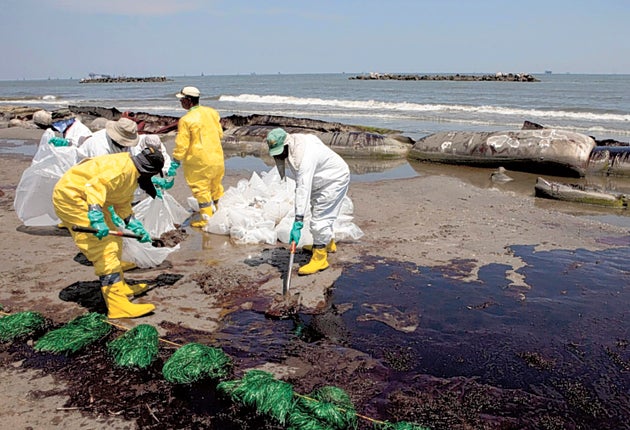Rig engineers accused of ignoring tests that foretold disaster

Your support helps us to tell the story
From reproductive rights to climate change to Big Tech, The Independent is on the ground when the story is developing. Whether it's investigating the financials of Elon Musk's pro-Trump PAC or producing our latest documentary, 'The A Word', which shines a light on the American women fighting for reproductive rights, we know how important it is to parse out the facts from the messaging.
At such a critical moment in US history, we need reporters on the ground. Your donation allows us to keep sending journalists to speak to both sides of the story.
The Independent is trusted by Americans across the entire political spectrum. And unlike many other quality news outlets, we choose not to lock Americans out of our reporting and analysis with paywalls. We believe quality journalism should be available to everyone, paid for by those who can afford it.
Your support makes all the difference.Managers and engineers aboard the Deepwater Horizon rig may have made a "fundamental mistake" in ignoring the results of tests conducted just hours before the explosion that doomed it, according to testimony given by a BP investigator to a congressional committee.
This and other revelations pointing to a likely sequence of human and mechanical failings on the platform were contained in a memorandum prepared by staff of the House Committee on Energy and Commerce, which resumed hearings in Washington yesterday.
Tracking the events aboard the rig in the hours before the blast – which would claim the lives of 11 men and trigger a still-unfolding environmental disaster in the Gulf of Mexico – will be crucial in ultimately assigning blame.
BP, which continues to spearhead its efforts to cap the well from a command centre here in Houston, has repeated this week that it is too soon to judge who was principally at fault.
Separate hearings in Louisiana involving some of the men who were on the rig before the 22 April blow-out also promised to help solve the mystery. A prepared statement from one witness spoke to concerns that BP may have too quickly replaced dense mud in the riser pipe from the well with sea water. If gas and oil were already bubbling through faulty seals, removing mud away may have been a key error.
Truitt Crawford, a casual worker for the drilling rig owner Transocean, told Coast Guard investigators that he had become aware of disagreements between his company and BP about the decision. "I overheard upper management talking, saying that BP was taking shortcuts by displacing the well with saltwater instead of mud without sealing the well with cement plugs, this is why it blew out," he said.
The congressional committee memo focuses on the last 22 hours of the rig's life when the team was engaged in the final cementing of the rig, including the installation of a temporary plug that would seal it until the time BP decided to return and begin drawing from it. People involved in putting the well in "rest mode" came from BP, as well as from Halliburton, who were doing the cementing, and Transocean.
Trouble may already have been brewing. According to the memo, about five hours before the blast, engineers detected an unusual dip in fluid levels in the riser pipe from the well to the surface. In hindsight that may have indicated a faulty seal or valve in the blowout preventer on the sea floor.
Perhaps more crucially, other tests designed to demonstrate the fastness of the cement came in with results that should have been "an indicator of a very large abnormality". It appears for now, however, that decisions were made at roughly 8pm to carry on with operations regardless – the likely "fundamental mistake". The catastrophe that destroyed the rig was to occur at 9.49pm.
In Washington, meanwhile, the US Interior Secretary, Ken Salazar, whose department is also under fire for years of lax oversight of the oil industry, said that plans for the start by Shell of exploratory drilling off the coast of Alaska would be revisiting and adjusted in the light of the Gulf calamity.
Anthony Hayward, the CEO of BP, was holed up in the command centre for most of yesterday. However, he spoke to the question of blame on CNN. "There were a whole series of failures here, the blowout preventer failed on three separate occasions," he said, confirming that the company's own investigators had turned over their findings to date to staff on Capitol Hill.
He flat-out denied, however, that the failures on the rig five weeks ago now had "anything to do" with the company trying to save costs, as analysts have widely insinuated. He called the well blowout and rig explosion an "unprecedented accident".
Join our commenting forum
Join thought-provoking conversations, follow other Independent readers and see their replies
Comments